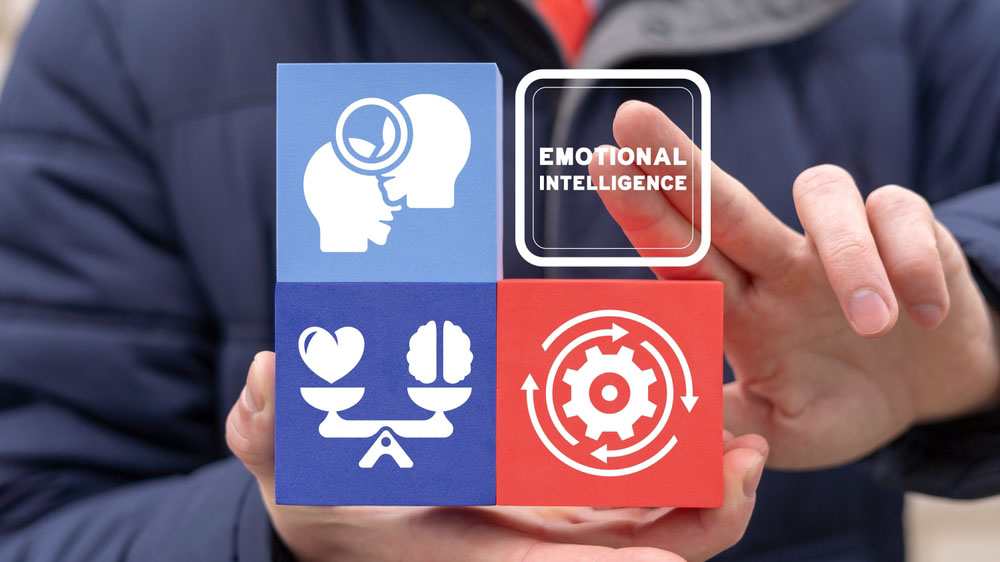The Hidden Superpower of Inspiring Leaders
Developing emotional intelligence for relational leadership is like discovering you have a hidden superpower — the ability to inspire, unite, and transform professional relationships with elegance.
In an era where technical skills alone are no longer enough to make a manager a leader, this form of emotional wisdom has become an essential lever for navigating human dynamics in the workplace with skill.
1- Emotional Intelligence: What Are We Really Talking About?
Emotional intelligence (EI), a concept popularized by Daniel Goleman, is the ability to recognize, understand, and manage your own emotions while also dealing effectively with those of others.
It is made up of five key skills:
- Self-awareness
- Emotional regulation
- Intrinsic motivation
- Empathy
- Social skills
In simple terms? It’s not about becoming an emotional sponge or a Zen monk — it’s about juggling moods (yours and others’) without dropping the fragile plates of workplace harmony.
2- Why Is Emotional Intelligence Crucial for Relational Leadership?
Because a leader isn’t just someone who can make decisions — they’re someone who can inspire action. And to inspire, you need to create connection. Without emotional intelligence, that connection is shaky.
Leaders with strong EI are better able to:
- Defuse conflicts with finesse
- Inject motivation during low points
- Listen actively (and not just pretend to!)
- Recognize both talents and doubts
- Create lasting trust within a team
A TalentSmart study revealed that 90% of top performers in companies have high emotional intelligence. That’s the kind of statistic that might make you trade in your Excel spreadsheets for a session of self-reflection!
3- The Emotionally Intelligent Leader: A Snapshot
Picture a team leader who, in the middle of a tense meeting, senses rising stress levels, adjusts their tone, calmly rephrases, and works toward a collective solution.
That’s not a superhero — that’s an emotionally intelligent leader.
Here are their secret weapons:
- Self-knowledge: They know stress makes them blunt, so they breathe before speaking.
- Emotional acceptance: Anger is a signal, not a weapon.
- Self-motivation: They don’t need a medal to move forward.
- Empathic listening: They hear what’s said — and what isn’t.
- Tactful communication: They tell the truth, but never to wound.
In short, they embody a calm, warm, contagious authority. And yes, that’s fully compatible with ambition and rigor!
4- Can You Learn to Be Emotionally Intelligent?
Good news: Emotional intelligence isn’t genetic. It can be developed, strengthened, and refined. Here are some ways to awaken the relational leader within you:
- Team Up with Your Emotions
Keep an “emotional journal”: When during the day do you feel most stressed? Irritated? Excited? This simple habit helps identify triggers and the needs behind emotions. - Practice the Emotional Pause
Before replying to a provocation or hitting send on that sharp email, take a pause — a breath, a walk, a moment of silence. That space is where awareness grows. - Listen Without Preparing Your Reply
Active listening means quieting your inner voice, too. Let the other person finish completely, without interrupting or judging — and only then respond. - Ask for Emotional Feedback
Try asking colleagues: “When I’m stressed, how do you perceive me?” It’s a powerful (and slightly vulnerable) question that can reveal surprising blind spots. - Work on Your Empathy
Shift perspective — step into someone else’s shoes, even if it means stepping out of your ego for a moment. Empathy is the bridge that turns tension into smooth collaboration.
5- Emotional Intelligence: A Strategic Lever for Companies
Organizations that train their managers in emotional intelligence often see an overall improvement in workplace climate, lower turnover, and higher collective performance.
It’s not magic — it’s human-centered management.
In a world of constant change, where hybrid work blurs relational cues, investing in emotional intelligence means investing in collective resilience. It also supports inclusive leadership, where everyone can express themselves without fear of judgment or being silenced.
6- Emotional Leadership: Watch Out for the Traps!
Cultivating emotional intelligence doesn’t mean tolerating everything or becoming the office confidant. Watch out for these pitfalls:
- Too much empathy can lead to emotional burnout — a leader is not a savior.
- Emotional regulation isn’t suppression — denying feelings doesn’t make you more effective.
- Authenticity doesn’t justify impulsiveness — express emotions, yes; unload them, no.
The balance is subtle, but it’s a source of tremendous relational strength.
In Conclusion: A Gentle Revolution
Developing emotional intelligence for relational leadership means stepping into a gentle but transformative revolution — one of conscious leadership that dares to see vulnerability as strength, listening as strategy, and relationships as a lever for excellence.
And maybe tomorrow, the best leaders won’t be the ones who shout the loudest, but the ones who sense, understand, and guide with precision.
If you think about it, the world of work would be better for it… and profoundly transformed.
Sources :
- What Makes a Leader? – Harvard Business Review (Daniel Goleman) : Lien
- Emotional Intelligence and Leadership Effectiveness – Journal of Organizational Behavior : Lien
- Emotional Intelligence: Why It Can Matter More Than IQ – Psychology Today : Lien
- Developing Emotional Intelligence in Leaders – Center for Creative Leadership : Lien
- The Impact of Emotional Intelligence on Leadership – Frontiers in Psychology : Lien


